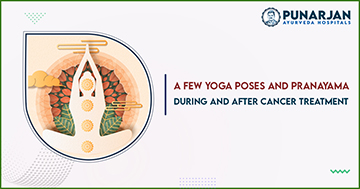Introduction:
In the face of adversity, the practice of yoga becomes a powerful ally for cancer patients, offering not only physical healing but also emotional solace and spiritual rejuvenation. In this profound journey of resilience, the integration of yoga asanas and pranayamas becomes a transformative path towards empowerment and renewal.
In this blog, we delve into the therapeutic benefits of specific yoga postures for the unique needs of cancer patients. We also explore the profound impact of pranayamas which can nourish the mind-body connection and foster inner harmony. Witness a few concepts of our ancients saints who had embraced the power of yoga to navigate their healing journey with unwavering determination.
Let us start with the Asanas now!
1. Mountain Pose (Tadasana):

In this foundational pose, we stand tall with feet firmly rooted to the ground, symbolizing resilience and stability. As cancer survivors, it reminds us that even amidst challenges, we can find strength in our center and radiate a sense of grounding and balance.
Benefits:
Tadasana, or Mountain Pose, offers cancer patients a grounding experience, instilling resilience and balance. Embodying strength and stability, it fosters a sense of empowerment and inner peace. By practicing Tadasana, patients can embrace their journey with renewed vitality, fostering a connection to their innate healing potential.
2. Warrior II (Virabhadrasana II):
This empowering pose embodies the spirit of a warrior, representing courage and determination. As survivors, we embrace the warrior within, channeling our energy towards healing and self-empowerment.
Benefits:
Virabhadrasana II, or Warrior II, empowers cancer patients with courage and determination. The pose opens the heart, encouraging self-compassion and strength. Embracing the warrior within, patients find solace in their journey, fostering a sense of resilience and empowerment, inspiring them to face challenges with grace and fortitude.
3. Tree Pose (Vrikshasana):
In this balancing pose, we root one foot into the earth while raising the other, symbolizing growth and renewal. Post-treatment, we cultivate inner and outer strength, embracing the opportunity for new beginnings.
Benefits:
Vrikshasana, or Tree Pose, provides cancer patients a profound sense of growth and renewal. Balancing on one leg symbolizes inner strength amidst adversity. This nurturing pose fosters self-confidence, enabling patients to embrace their journey with grace, finding stability and new beginnings, like a flourishing tree standing tall.
4. Cobra Pose (Bhujangasana):
As survivors, we rise like a cobra, opening our hearts to new possibilities. This heart-opening pose encourages self-love and acceptance, embracing our bodies as they are, with gratitude for their resilience.
Benefits:
Bhujangasana, or Cobra Pose, offers cancer patients a heart-opening experience. It encourages self-love, acceptance, and renewal. By gently arching the back, patients find emotional release and serenity. This empowering pose fosters a sense of inner strength and gratitude, nurturing their healing journey with compassion and resilience.
5. Child’s Pose (Balasana):
In this gentle resting pose, we find comfort and surrender, honoring the need for rest and self-care on our healing journey. We embrace our vulnerability and practice self-compassion.
Benefits:
Balasana, or Child’s Pose, provides cancer patients a soothing and restorative refuge. This gentle pose encourages relaxation, releasing emotional tension. By surrendering to the earth, patients find solace, embracing vulnerability with self-compassion. It nurtures a sense of comfort and renewal, fostering inner peace and a tranquil healing journey.
Pranayamas for Post-Treatment Cancer Survivors:
Deep Belly Breathing:
Breathing deeply into the belly calms the nervous system, reduces anxiety, and enhances overall well-being. As survivors, we cultivate a mindful connection with our breath, finding peace and solace within.
Benefits:
Deep Belly Breathing offers cancer patients a calming and healing experience. By engaging the diaphragm, it reduces anxiety and stress, nurturing emotional well-being. Patients find solace in each breath, fostering a mindful connection to their inner strength and resilience. This breath practice instills a sense of peace and tranquility on their journey.
Nadi Shodhana (Alternate Nostril Breathing):
This balancing breath technique brings equilibrium to the mind and body, fostering emotional harmony. Through this pranayama, we clear energy channels and invite a sense of balance and restoration.
Benefits:
Nadi Shodhana, or Alternate Nostril Breathing, brings harmony and balance to cancer patients. It clears energy channels, promoting emotional equilibrium. Patients find solace in this gentle pranayama, nurturing a sense of inner peace and renewal. It fosters a mindful connection, empowering them to navigate their healing journey with grace and serenity.
Ujjayi Breathing (Victorious Breath):
Ujjayi breath soothes the mind and calms the emotions. This gentle, ocean-like breath helps survivors find inner tranquility and tap into their inner strength.
Benefits:
Ujjayi Breathing, or Victorious Breath, nurtures cancer patients with a calming and soothing experience. This ocean-like breath alleviates anxiety and enhances mental clarity. Patients find solace in its gentle rhythm, fostering inner tranquility and strength. Ujjayi empowers them to face challenges with resilience and a sense of inner victory on their healing path.
Kapalabhati (Skull-Shining Breath):
This energizing breath detoxifies the body and revitalizes the mind. As survivors, we embrace the renewal of our being, letting go of toxins and embracing fresh vitality.
Benefits:
Kapalabhati, or Skull-Shining Breath, revitalizes cancer patients with an energizing and detoxifying experience. This breath technique invigorates the body, fostering a renewed sense of vitality. Patients find solace in releasing toxins, cultivating inner rejuvenation, and embracing fresh vitality on their healing journey, like a radiant sun illuminating their path.
Conclusion:
In conclusion, the journey of cancer patients is undoubtedly challenging, but the integration of yoga asanas and pranayamas offers a powerful tool for healing, rejuvenation, and empowerment. Through the practice of gentle yet transformative postures like Tadasana, Virabhadrasana II, Vrikshasana, Bhujangasana, and Balasana, patients find a profound connection to their inner strength and resilience. Combined with the breath control exercises, cancer patients embark on a journey of self-discovery. Yoga becomes a sanctuary where they can release emotional burdens, find solace in tranquility, and embrace the present moment.
Witnessing the transformation in these warriors is a humbling experience. The holistic practice of yoga empowers them to navigate their healing journey with renewed vitality, compassion, and grace. Each asana and pranayama ignites a spark of hope and strength, illuminating the path ahead, guiding them towards a brighter future filled with courage and determination.
Yoga is a light that guides our wisdom out from the darkness. As a holistic ancient art of spirituality, it inspires cancer patients to face life’s challenges head-on with unshakable determination.
——————— This is a call from Punarjan Ayurveda Hospital to accept the power of yoga! Because it is a source of comfort, inspiration, and steadfastness in cancer cure.
“EMBARK AND JOIN OUR JOURNEY INTO A CANCER-FREE REALM”



